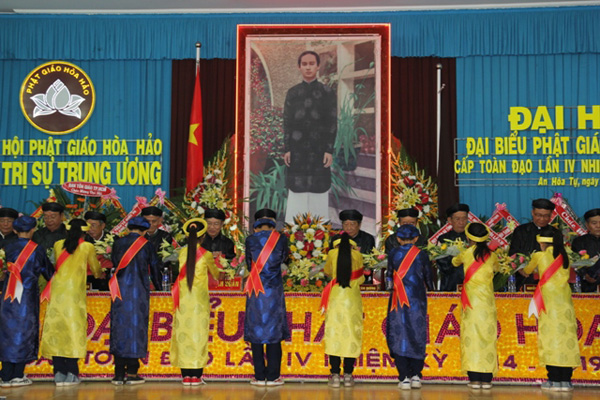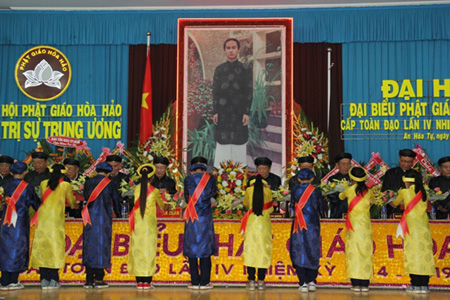Initially, Hoa Hao Buddhism appeared as one of the superstitious phenomena found in the Mekong River Delta. The locals there believed in the mysterious power of fortune-tellers, who were considered the physical embodiment of spirits. Of all the fortune-tellers in the former area of Bay Nui, Chau Doc, Huynh Phu So was the most influential and later became the founder of Hoa Hao Buddhism.
He was born on January 15, 1920, into a well-to-do family in Hoa Hao Village, Tan Chau District, Chau Doc Province (present-day Phu My Commune, Phu Tan District, An Giang Province). He was the fourth son of Huynh Cong Bo, Head of Hoa Hao Village, and Le Thi Nham. As a child, he was an indifferent and quiet boy who often stayed away from the crowd. However, he was clever and sensitive and had an aptitude for poetry. He graduated easily from the local primary school, but he had to discontinue his education because of illness. He was affected by malaria and spermatorrhea, and so he was weak and pale. Having reached adulthood, he did not think about getting married. His family, who cared for him deeply, attempted to find every possible means to treat his illness. They turned to many well-known doctors and shamans in the area, but none of them could find a cure. Finally, he was sent to That Son (in the area of Bay Nui, An Giang) for treatment. That Son, in the late nineteenth and early twentieth centuries, was rumored as a land of legends. It was a hermitage for shamans, as well as a hidden place for strong-willed patriotic scholars. Therefore, this desolate and mysterious land was where patriotism had always been nourished.

During his treatment, Huynh Phu So learned many Vietnamese herbal medicines and methods of incantation. He also spent a lot of his time reading Trang Trinh's oracles and studying the thought of Buu Son Ky Huong. His patriotism was formed and molded at that time. Huynh Phu So was particularly inspired by Buddhism during the Tran Dynasty. The ideology of Buddhism during this period was captured through beautiful images of monks taking off their robes to join the fight to save their country and those of the Tran Dynasty's kings and mandarins both practicing the religion and taking care of the court affairs.
In 1937, at the age of seventeen, despite having not overcome his illness, Huynh Phu So returned home and claimed that he was a Sinh nhu tri (born fortune-teller) who was able to see into the past and the future. He said that he had met Buddha Amitabha, Sakyamuni, and the Jade Emperor. He claimed that they had added years to his life so that he could propagate the ideology of Buu Son Ky Huong in order to help Buddhism prevail, save the people from their wretchedness and take them to the Western Paradise. In one of his oracles, he indicated:
The virtuous Buddha Amitabha spread the morality As he took pity on mankind He decreed me to teach you. With love for him, I weaved on the misery here-below The hearty Buddha's wu-wei (asamskrta) religion Continued the former Sakyamuni's will.
Afterward, he started to treat diseases and save the people using the remedies he had learned. He offered free treatment and also preached the ideology of Buu Son Ky Huong by Tay An Buddhist Teacher and Tu An Hieu Nghia by Ngo Loi through the oracles he had prepared. During his lectures, he also propagated and praised the tradition of fighting against foreign aggression through the examples of national heroes, predecessors, and disciples of Tay An Buddhist Teacher, such as Quan Thanh (or Tran Van Thanh), Chai Lich (or Nguyen Trung Truc), Ngo Loi (or Ngo Tu Loi) and Cu Da. Thanks to this, more and more people came to Huynh Phu So for medical treatment and followed him.

On May 18, 1939, having found that it was time for him to establish a religion, he held the Linh Thu Son Trung Tho Menh ceremony at his house and declared the birth of a new sect of Buddhism called Hoa Hao Buddhism or Hoa Hao.
It should be noted that during his life, he did not call his religion Hoa Hao Buddhism. In his religious works, he often used the pen name Hoa Hao—the name of his birthplace. Before the religion was officially called Hoa Hao Buddhism, it had been known by many other names which indicated its features, such as "Dao Tu Sen" (the Faith of Tu Sen, Huynh Phu So's other name), "Dao Khung" (the Faith of Khung, another name) and "Ong Dao Lang Hoa Hao" (the Religion of a Hoa Hao Villager).
According to documentation, the name "Hoa Hao Buddhism" appeared around 1948, one year after the death of Huynh Phu So. When internal conflicts occurred, it became necessary for the newly-established sect to have an official name for convenience in working with the French government. Later, in 1964, when the association was founded and recognized by the Sai Gon authorities, the name "Hoa Hao Buddhist Sangha" was officially used. In 2004, when its new chapter was built, the name "Hoa Hao Buddhism" was still in use. This name demonstrates the doctrinal connection between this religion and Buddhism. As for religion, it is regarded as a Buddhist sect.



